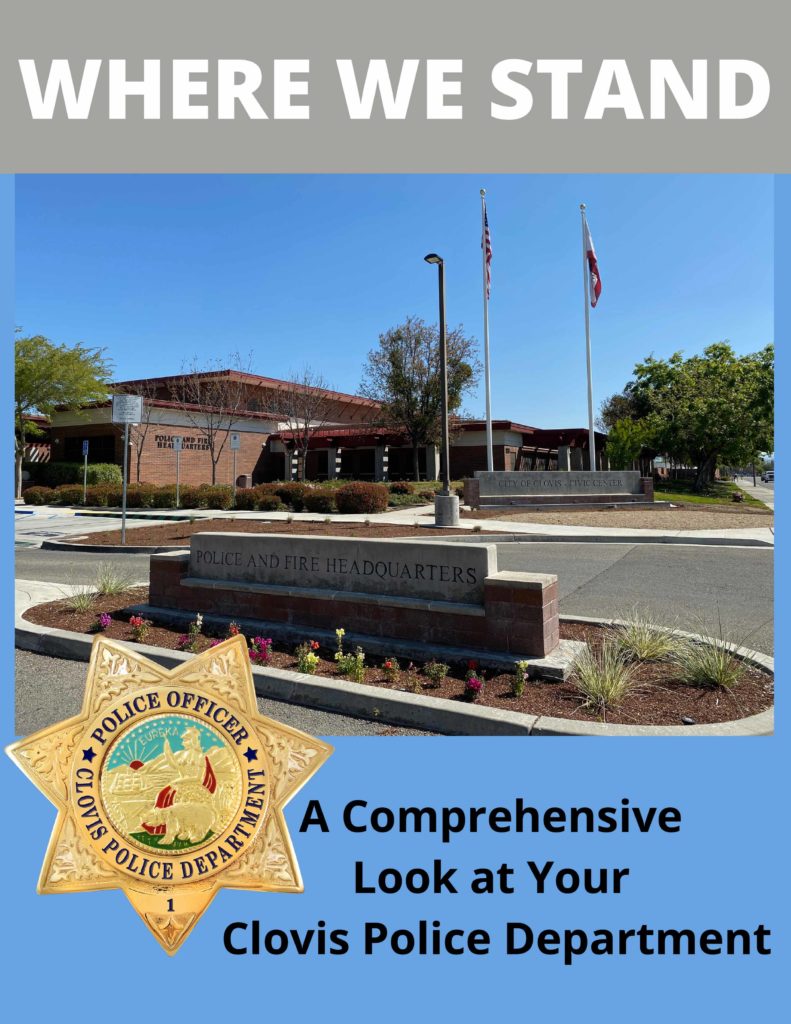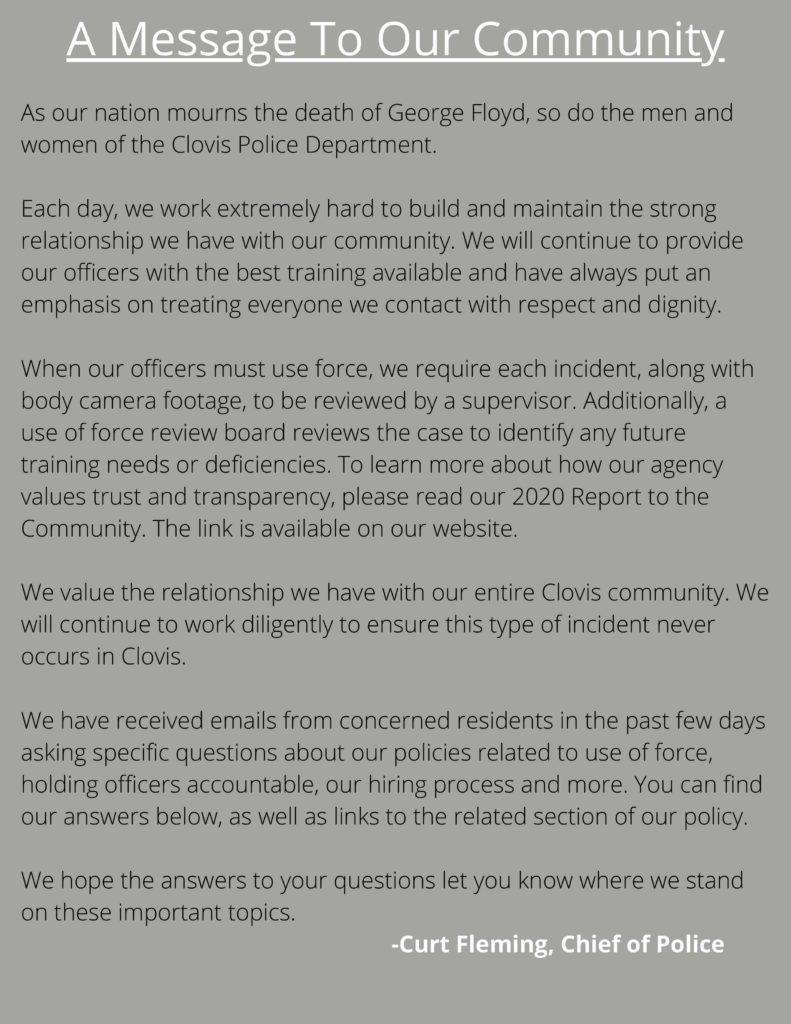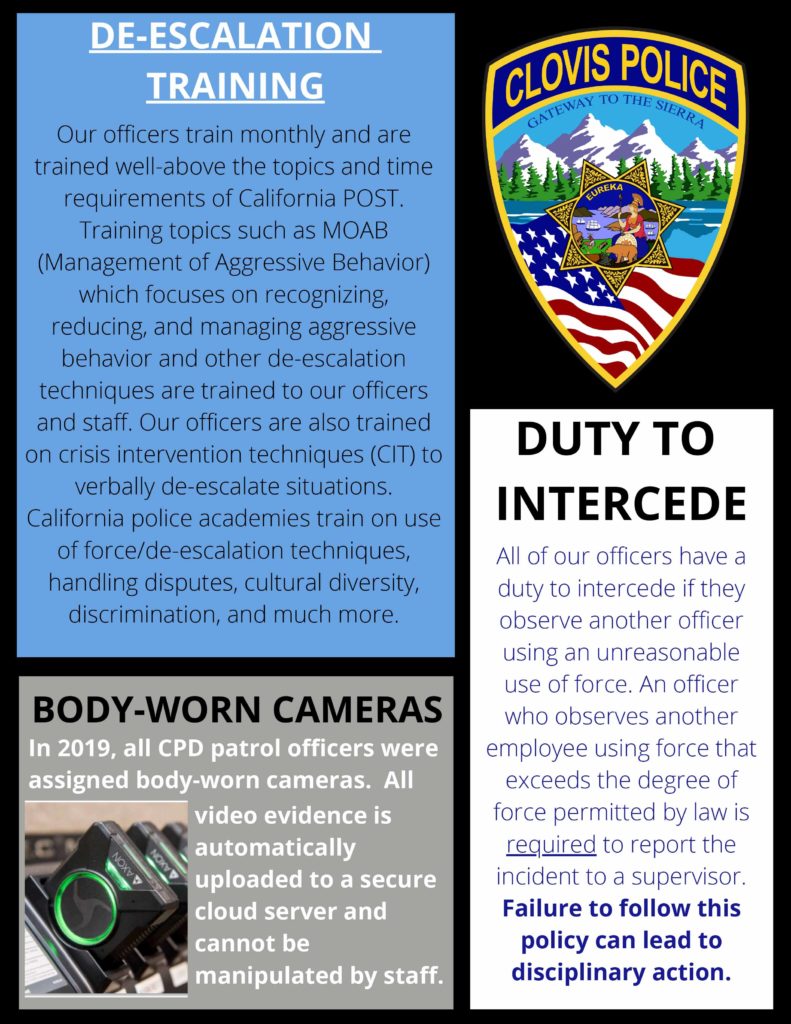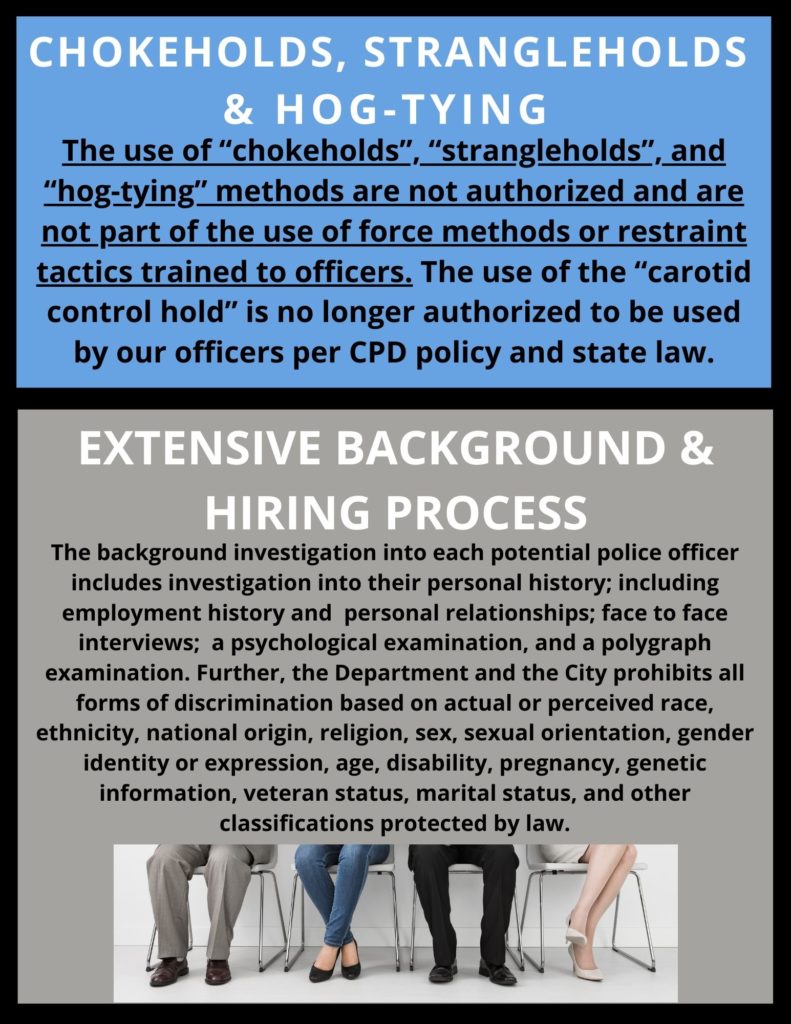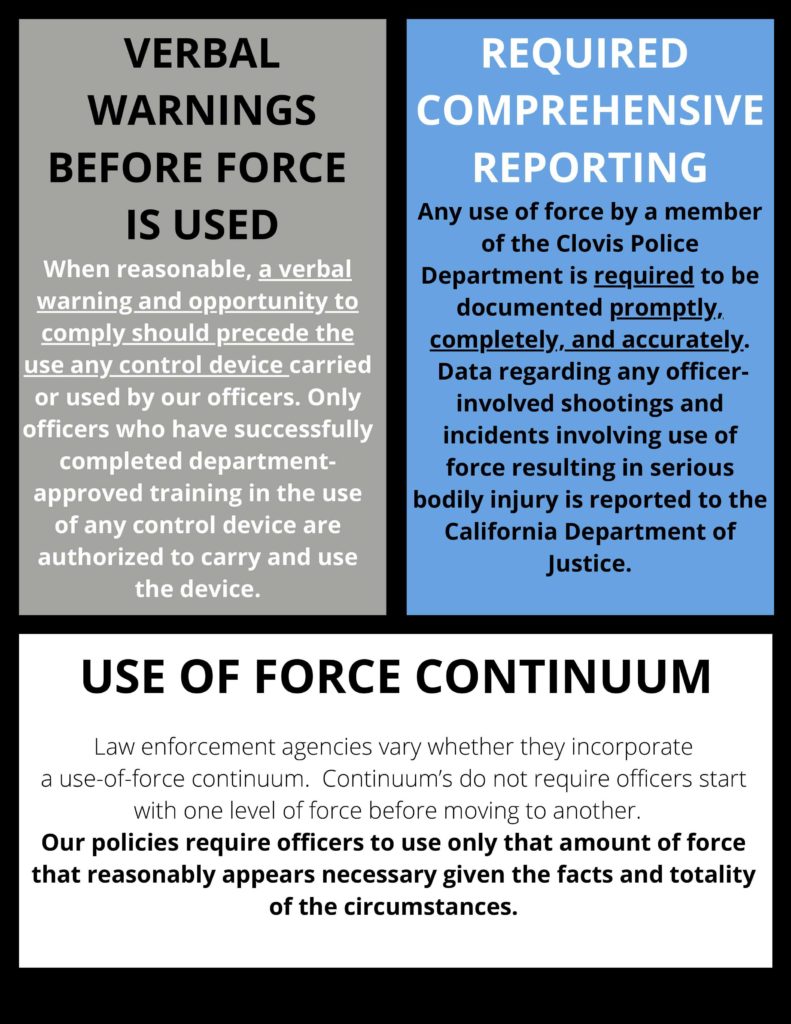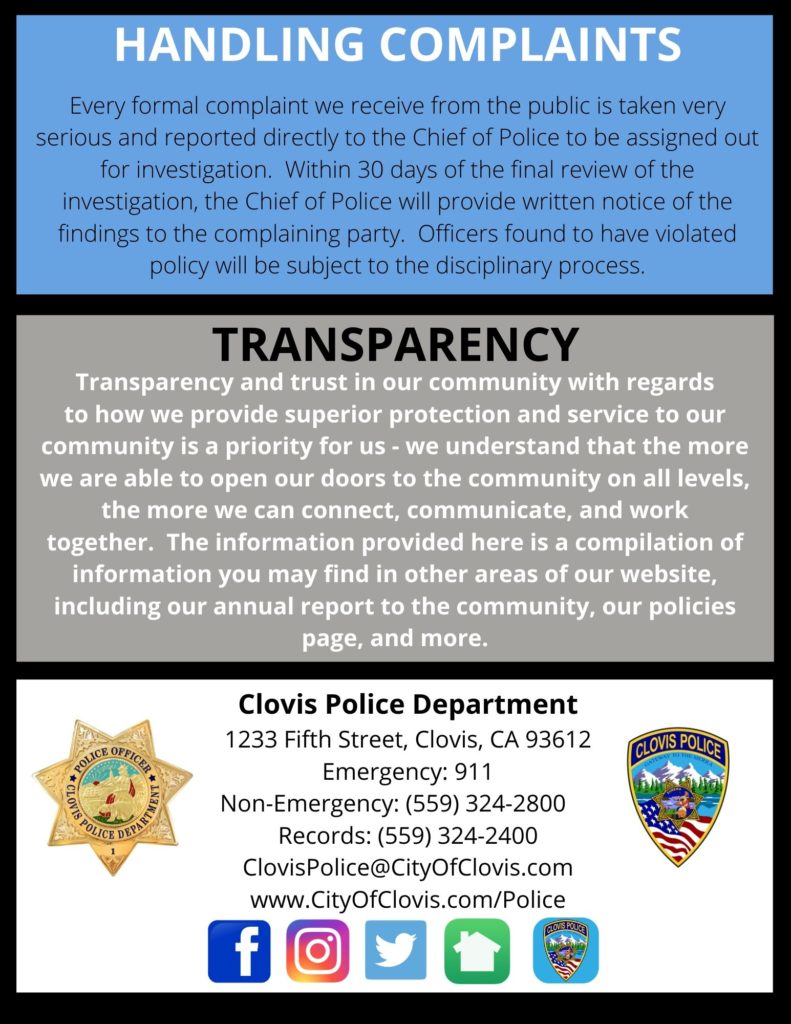As our nation mourns the death of George Floyd, so do the men and women of the Clovis Police Department.
Each day, we work extremely hard to build and maintain the strong relationship we have with our community. We will continue to provide our officers with the best training available and have always put an emphasis on treating everyone we contact with respect and dignity.
When our officers must use force, we require each incident, along with body camera footage, to be reviewed by a supervisor. Additionally, a use of force review board reviews the case to identify any future training needs or deficiencies. To learn more about how our agency values trust and transparency, please read our 2021 Report to the Community here:
We value the relationship we have with our entire Clovis community. We will continue to work diligently to ensure this type of incident never occurs in Clovis.
We have received emails from concerned residents in the past few days asking specific questions about our policies related to use of force, holding officers accountable, our hiring process and more. You can find our answers below, as well as links to the related section of our policy.
We hope the answers to your questions let you know where we stand on these important topics.
Curt Fleming, Chief of Police
Your Questions:
Are the officers in the Clovis Police Department thoroughly screened to ensure that they do not have a history of abuse, racism, xenophobia, homophobia/transphobia, and any other unlisted form of discrimination?
The Citizens of Clovis deserve to have the men and women of the Clovis Police Department meet the highest standards for training, education, ethics, and dedication while serving the entire community. Accordingly, our department has a very selective hiring process and a comprehensive training program. We take the hiring process very seriously and use an intensive, multi-step process to screen all candidates. The background investigation into each potential police officer includes investigation into their personal history; including employment history and personal relationships; face to face interviews; and a polygraph examination. Further, the Department and the City prohibits all forms of discrimination based on actual or perceived race, ethnicity, national origin, religion, sex, sexual orientation, gender identity or expression, age, disability, pregnancy, genetic information, veteran status, marital status, and other classifications protected by law. For more on the how the background process works please see: https://joinclovispd.com/hiring-process/
Are the police officers in the Clovis Police Department being trained to de-escalate altercations by using peaceful conflict resolution strategies?
Most contacts and interactions end with peaceful resolutions and voluntary compliance. In the police academy POST (California Commission on Police Officers Standards and Training) mandates that officers train on the use of force/de-escalation techniques, handling disputes, cultural diversity, discrimination, and much more. Our officers train monthly and are trained well-above the topics and time requirements of California POST. Training topics such as MOAB (Management of Aggressive Behavior) which focuses on recognizing, reducing, and managing aggressive behavior and other de-escalation techniques are trained to our officers and staff. California law also mandates that officers use only the amount of force that reasonably appears necessary. Our officers are also trained on crisis intervention techniques (CIT) to verbally de-escalate situations. We also coordinate with mental health professionals that work inside our Police Department and respond to calls in the field in order to assist our officers and staff develop an education and response protocol. (PC 835) (Clovis Police Department Manual (“CPDM”) policies 300.3, 465.4)
Are the police officers in the Clovis Police Department required to intervene if they witness another officer using excessive force? Additionally, will officers be reprimanded if they fail to intervene?
All of our officers have a duty to intercede if they observe another officer using an unreasonable use of force. An officer who observes another employee using force that exceeds the degree of force permitted by law is required to report the incident to a supervisor. Failure to follow this policy can lead to disciplinary action. Furthermore, every member of the Clovis Police Department is responsible for reporting any suspected or known instances of bias-based policing to a supervisor. Officers have a duty to intercede to prevent any biased-based actions by another officer. (CPMD policies 300.2.1, 402.4)
Are the police officers in the Clovis Police Department forbidden from using hog-tying methods and carotid restraints?
The use of “chokeholds”, “strangleholds”, and “hog-tying” methods are not authorized and are not part of the use of force methods or restraint tactics trained to officers. The use of the “carotid control hold” is no longer authorized to be used by our officers per CPD policy and state law. (CPDM policy 300.3.4)
Is there an explicit and enforced use-of-force continuum that details the acceptable weapons and force to be wielded in an extensive range of civilian-police interactions?
Law enforcement agencies vary whether they incorporate a use-of-force continuum. Continuum’s do not require officers start with one level of force before moving to another. Our policies require officers to use only that amount of force that reasonably appears necessary given the facts and totality of the circumstances. (CPDM policy 300.3)
Are the officers in the Clovis Police Department required to give a verbal warning to civilians before drawing their weapon or using force?
When reasonable, a verbal warning and opportunity to comply should precede the use of any control device carried or used by our officers. Only officers who have successfully completed department-approved training in the use of any control device are authorized to carry and use the device. (CPDM policy 308.3)
Are the officers of the Clovis Police Department required to report every occasion they threaten to or use force on civilians?
Any use of force by a member of the Clovis Police Department is required to be documented promptly, completely, and accurately. Data regarding any officer-involved shootings and incidents involving use of force resulting in serious bodily injury is reported to the California Department of Justice. (CPDM policy 300.5)
Are the officers in the Clovis Police Department trained to perform and/or seek medical action after using force?
California law and our policy mandate that medical assistance be obtained for any person who exhibits signs of physical distress, who has sustained visible injury, expressed a complaint of injury or continuing pain, or who was rendered unconscious. (PC 835) (CPDM policy 300.6)
Is there an early intervention system enforced to correct officers who use excessive force?
When our officers must use force, we require each incident, along with body camera footage, to be reviewed by a supervisor, and immediately reported to the Chief of Police. Any incident that is suspected to be outside of policy is assigned out to be formally investigated and could be subject to the disciplinary process. Additionally, a use of force review board reviews all cases were force has been used to identify any future training needs or deficiencies. (CPDM policy 300.8)
Additionally, how many complaints does an officer have to receive before they are reprimanded? No more than three should be standard.
Every formal complaint we receive from the public is taken very serious and reported directly to the Chief of Police to be assigned out for investigation. Within 30 days of the final review of the investigation the Chief of Police will provide written notice of the findings to the complaining party. Officers found to have violated policy will be subject to the disciplinary process. (CPDM policy 1020)
Transparency and trust in our community with regards to how we provide superior protection and service to our community is a priority for us – we understand that the more we are able to open our doors to the community on all levels, the more we can connect, communicate, and work together. The information provided here is a compilation of information you may find in other areas of our website, including our annual report to the community, our policies page, and more.

